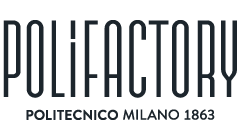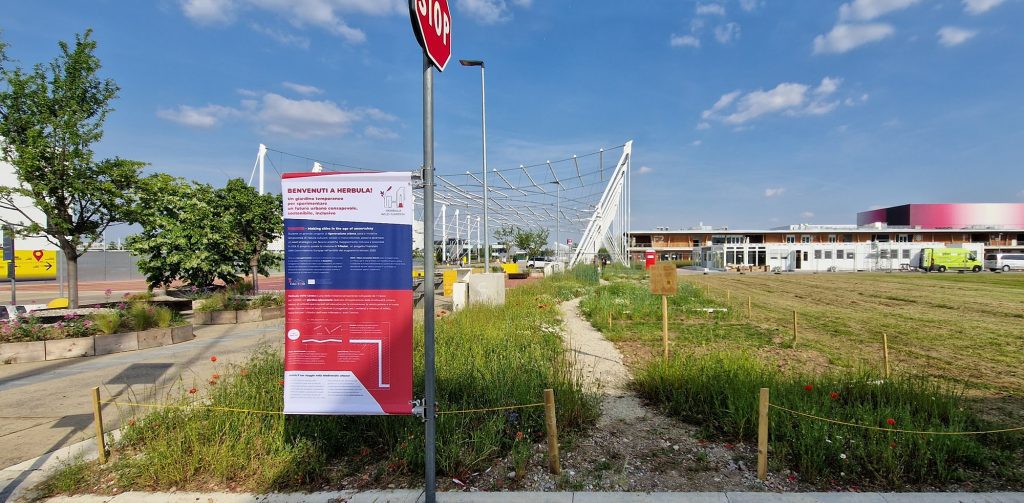T-Factor@MIND – Milano Innovation District
Temporary experiments for a sustainable and inclusive urban future.
T-Factor is an Innovation Action project (Horizon 2020) that explores the transformative potential of “meanwhile uses” in urban regeneration processes.
As years or even decades can pass between the approval of a regeneration plan and its actual implementation, more and more unused or degraded buildings, plots and spaces within urban areas are being transformed into sites for temporary co-creative experimentation through a multitude of innovative cultural, social and entrepreneurial activities.
The aim of the T-Factor project is to create an international network of exchange and collaboration to demonstrate the transformative potential of temporary uses as critical assets for the city to establish more inclusive and sustainable regeneration processes.To this end, during the course of the project, 25 European partners and 6 pilot cities – Milan, London, Bilbao, Amsterdam, Kaunas, Lisbon – worked to design, prototype and test different types of temporary initiatives through the involvement of local communities.
The city of Milan hosted one of the 6 pilot projects at MIND – Milano Innovation District – formerly Expo2015 area – as it is the subject of a large regeneration project scheduled to end in 2031. The Milan pilot project focused on the realisation of temporary initiatives with the aim of:
- MISSION 1: Create a dynamic community open to the exchange of ideas, projects and scientific knowledge;
- MISSION 2: Promote conscious and sustainable lifestyles through the knowledge and protection of urban biodiversity;
- MISSION 3: Build a shared identity for the district and foster accessibility through osmosis between internal and local realities.
Among these initiatives, Polifactory specifically addressed mission 2 and 3, through the design of Herbula Wild Garden and the MIND Community House.
Herbula Wild Garden
Herbula Wild Garden consists of a temporary herbal garden dedicated to the cultivation of indigenous herbs and flowers, fostering local biodiversity and the smart use of its products. The garden endorses the function of educating surrounding communities to the benefits of urban biodiversity, preserving the natural environment, as well as providing a space for learning and experimentation for students of different ages.
Herbula is composed of three different areas:
- an area with planters, dedicated to the cultivation of aromatic and officinal herbs available to those interested in using them for culinary or herbal preparations;
- an experimental area, dedicated to educational research and botanical or agronomic experiments, especially devoted to the cultivation of edible native species that can be processed and transformed into everyday products;
- a flowery meadow, dedicated to spontaneous vegetation capable of attracting pollinators and other useful insects.
The differentiation between these areas allowed the development and realization of different kinds of initiatives around the topic of urban biodiversity.
BiodiverCity@MIND for Schools, an environmental education initiative for local primary and secondary school students, conducted in cooperation with landscape architects and a local association of natural science experts.
The initiative involved the students in a series of activities, conducted both in the classroom and at the MIND flowery meadow, aimed at learning about and getting in touch with local biodiversity. Specifically, during the field activities, the students were accompanied by natural science experts on a biodiversity tour and were involved in a workshop led by the Polifactory team. The workshop consisted of assembling specially designed bug hotels produced by the design team through digital fabrication technologies and composing seed bombs to sow the flower meadow itself.
Herbula Lab, a workshop aimed at designing and setting up Herbula’s experimental area, which involved the students of an agricultural high school in Milan. In agreement with the school’s teachers, it was decided to create a resilient wild garden, composed of edible native plants, suitable for transformation into everyday products, for gastronomic, cosmetic or herbal purposes.
Once the herbs had been selected and planted in the dedicated area, a practical activity was organised in the school to show the students how to transform the plants through processes such as distillation, fermentation and dehydration, experiencing at first hand the tools and technologies required for this purpose.
Civic Nature Exhibition, an experiential path through the different areas of Herbula, where visitors could find various information panels, developed by the Polifactory team, aimed at spreading awareness about urban biodiversity and how to interact with it. These panels provided information on the herbs and wildflowers in the garden and were linked via QR codes to further digital content. In addition, throughout the path, people were invited to action by contributing to biodiversity mapping on the iNaturalist app, following the simple instructions provided on the panels.
Biodiversity Ambassador Programme, an activity dedicated to MIND companies to get them to start considering biodiversity in their sustainability budgets and to include biodiversity-related activities in their welfare system. Participation in the programme included an open call for company employees to carry out simple biodiversity mapping activities to survey the fauna present in the district.
Bioscopium, an innovative wildlife biodiversity mapping system aimed at supporting developers, politicians and other decision-makers involved in regeneration projects in learning about, preserving and implementing wildlife in the regeneration area. The system includes the use of sensor stations, designed by the Polifactory team in a modular manner to be configured and customised on a case-by-case basis according to the biotope to be monitored and to overcome the current limitations of monitoring by human observation or the use of phototraps.
Find the Bioscopium Handbook here.
Mind Community House
The Community House is conceived as a symbolic space of collaboration between MIND actors and the non-profit realities of the territory, in which to propose and realise joint initiatives in a spirit of exchange and cross-pollination to the benefit of both the district’s internal and external ecosystem.
Its objective is the gradual overcoming of barriers and perceived differences between the internal and external/profit and non-profit worlds, in a spirit of mutual and real collaboration.
The Polifactory team supported the co-creation process of Futurabili, the first initiative of the MIND Community House. Futurabili is a career orientation path to the professions of the future aimed at all young people who reside or live in one of the municipalities in the north-west Milan area or in the city of Milan. The path offers a series of training experiences on topics such as artificial intelligence, Industry 4.0, rapid prototyping and advanced materials, led by MIND companies.
The success of the first experimentation allowed the initiative to be replicated for a second edition in collaboration with other third sector organizations in neighbouring municipalities and to transform the path into a consolidated format.
Periodo
June 2020 - May 2024
Parole Chiave
City Making
Co-creation
European Research
Prototipazione
Research
Urban Metabolism











